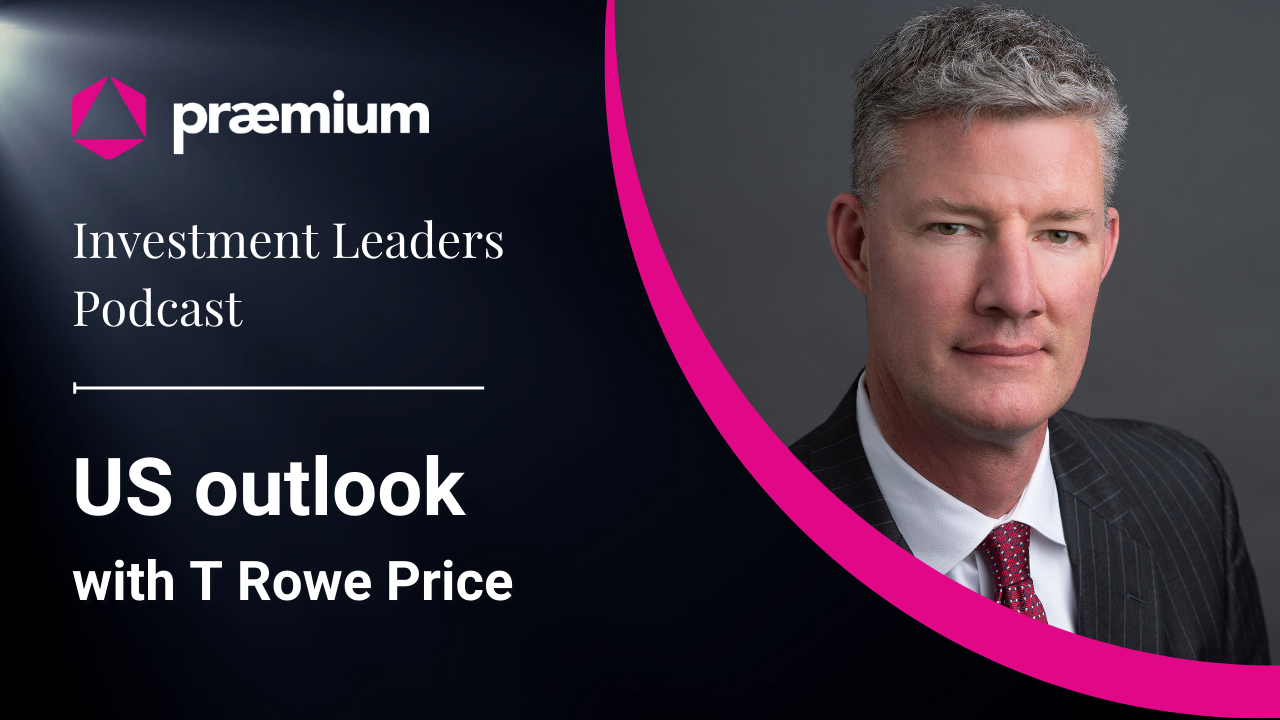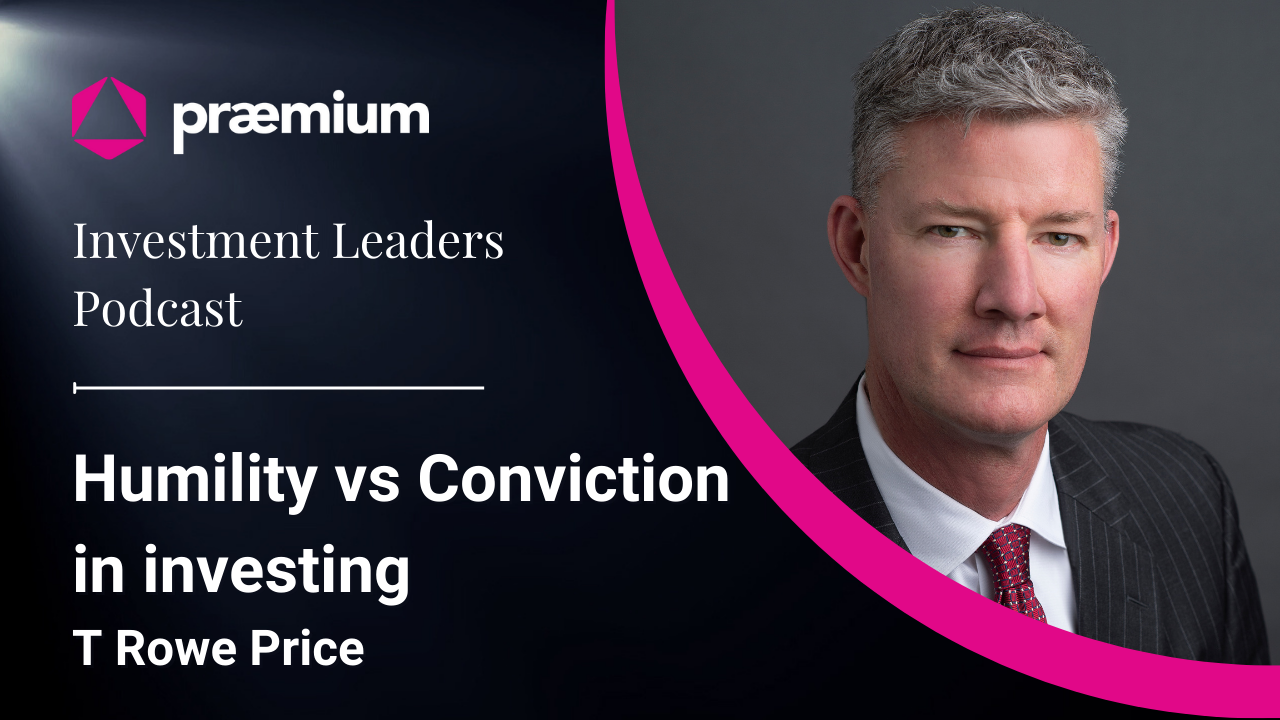This transcript has been edited for clarity and brevity.
Damian Cilmi: Welcome, listeners, to the Praemium Investment Leaders podcast. I'm your host, Damian Cilmi, Head of Investment Managers and Governance at Praemium, one of Australia's fastest-growing investment platforms. Today, we are delighted to have Peter Bates from T. Rowe Price joining us from their Baltimore head office. We'll discuss how our experiences shape us and our investment philosophies, as well as provide an update on global equities and the American economy.
Peter Bates is the Portfolio Manager of the Global Select Equities Strategy in the International Equity Division. He has been with T. Rowe Price for over 17 years, serving as Vice President of the T. Rowe Price Group and Executive Vice President of T. Rowe Price International. T. Rowe Price was founded in Baltimore, Maryland, in 1937 by Thomas Rowe Price, Jr., who pioneered growth-style equity investing. The group is listed on the New York Stock Exchange, has investment staff in over 16 countries, and manages funds worth AUD $1.8 trillion. Peter, welcome to the show and Australia.
Peter Bates: Thank you. It's great to be here.
Damian Cilmi: So, we were discussing how history shapes us, which is true for all of us, especially in investing. Let's talk about your history, the early lessons you learned in your career that informed your investment philosophy, and how that aligns with T. Rowe Price.
Peter Bates: Reflecting on my journey, I started at T. Rowe Price with a sense of false arrogance after graduating from business school. I began in 2004, during a bull market, which was an ideal time. But you don’t really know what you know until you’ve had a tough market. Early in my career, I worked with several industrial companies and made an impact.
In 2007, the economy hinted at a potential recession, with an inverted yield curve, subprime mortgage issues, and a problematic housing cycle. Convinced a recession was imminent, I downgraded stocks and conservatively positioned my assets. Contrary to expectations, the recession didn't come right away, and macro data improved throughout 2007. My subsector of industrials grew by about 25%, but my conservative investments couldn’t keep up, with my stocks only increasing 15-20%. As a result, my performance review was disappointing. We can only make money if we perform for our clients that means we must beat the market.
And I think it was very humbling to be so wrong, frankly. When you're wrong, you can either ignore it and claim you just need more time, or you can evaluate what you could have done better. It wasn't until the summer of 2008 that the markets took a downturn. During that stressful period, I felt the pressure and started soul-searching. With three kids, I needed to make things work.
Through this process, I realized I had made such a significant macro bet that my individual work didn't matter, which was both humbling and frustrating. I was working 60-hour weeks for seemingly no reward, and it was nerve-wracking since recessions typically occur once every ten years. Eventually, a recession did take place, and many stocks corrected, which felt like a bailout. I was 18 months early in predicting the recession, but if I had been 24 or 30 months early, my career might not have survived. I learned that it's crucial to balance conviction with the acknowledgment that we might be wrong. We need to manage risk effectively to ensure we have enough time for our bets to pay off. I could have handled the situation better by positioning myself conservatively without being overly aggressive. This approach would have allowed me to capitalize on the stocks that rallied by 30% in 2007. Since I was already all-in on a recession, I didn't have anything to sell.
After witnessing several stocks increase by 30%, I learned that my value-add in the market, and for the firm and our clients, is in stock picking. I select stocks with a favorable risk-return profile, rather than making macro bets.
Damian Cilmi: As a portfolio manager, what are the temptations when you're 5% or 10% behind?
Peter Bates: That's a great question. Going back to Q1 of 2022, I had been at T Rowe for a long time, very established with a good track record, which means the pressure around any given 6 month period or 12 month period goes away because I had good numbers over 5 or 10 years. But when after launching the Global Select Portfolio in December 2020, I effectively re-started my track record. I felt invigorated, like I was starting fresh. My first year went well, but Q1 2022 brought challenges, such as the spike in rates and the war that exacerbated inflation. At one point, I was down 300 or 400 basis points, so I had to re-evaluate my thesis that the inflation would be temporary and admit where I was wrong. I made some changes to the portfolio to increase commodity material exposure, but I also held on to some stocks I believed would continue to grow and compound value. I changed about 20% of the portfolio, which is significant in any given period. My turnover was 65% in 2022, higher than usual.
In such situations, it's crucial to strike a balance between admitting mistakes and maintaining conviction in your positions. You can't be stubborn, but you also can't constantly chase your tail. There's no mathematical equation for handling these situations but having a reliable process for analysing risk-return can help guide your decisions.
I'm going to compliment my wife, because I think admitting you're wrong with investing is kind of like the feeling you get when you know you need to apologise to your wife. And the longer you wait to do it, the worse it gets. But so, my wife has been very adept at helping me learn when I need to apologize. And, and I have learned the sooner you do it, the better. You’ve got to fail fast.
Damian Cilmi: You mentioned betting on stocks, not on macro events. How does this balancing act look practically in the portfolio? And when do strong industry conditions start to resemble macro bets?
Peter Bates: The current situation reminds me of 2007, with an inverted yield curve and potential downturn. Although I'm concerned about a recession, equity markets have been performing well, and I've modestly outperformed during this rally. I want to stay involved in the market because you don't know what will happen, and I'm bullish on equities long-term. However, I also want to keep my hand on my wallet and be cautious. I don't want to be overexposed and have a significant drawdown. Instead, I want to be in a position to lean into risk when things get more attractive. I'm ready for an earnings or valuation correction, and I've learned from my 2007 mistakes.
Damian Cilmi: You've historically had a mid-cap bias. What's your case for mega caps?
Peter Bates: With industrials, I had a mid-cap bias because within industrials, to really grow faster than the economy, you need to be a smaller company that serves some niche, that the end market is growing faster and the niche has to be small enough that big companies don't see a big enough profit pool to come into it. However, with Global Select, my median market cap weighted average is around 70 billion, which is large cap.
I own several stocks in the 10 to 30 billion market cap range. Global Select offers a core product, meaning we invest in established, profitable companies. I have some growth-oriented and deeper value investments, but I don't invest in unproven business models; that's for small cap growth funds.
Regarding mega caps, some are fine, but I believe the stocks that defined the last 20 years won't define the next 20. For example, FANG stocks may not deliver the same returns in the coming years. When I started at T Rowe, Bill Stromberg asked me what I wanted to cover. In 2003, I chose to cover waste management companies like Waste Management, Republic Services, and Waste Connections, rather than hardware stocks like Intel and Dell. I thought that the stocks of the 90s wouldn't be the stocks of the 2000s.
I feel the same way now about mega cap tech stocks. They may not be terrible, but they likely won't offer the returns they did in the past decade. In Global Select, I aim to find the next generation of stocks that could be multiple compounders over five or more years.
Damian Cilmi: I think semiconductors fall into that category.
Peter Bates: I'm very bullish on semiconductors, as they can offer returns justifying the risks. Society's increasing demand for better chips in AI, data centers, and autonomous driving supports this durable trend. Companies making, designing, or supplying machines for chips will likely make more money in the future.
Damian Cilmi: There's also a geopolitical aspect to chips.
Peter Bates: Indeed, geopolitical stress creates inflation and pushes companies to diversify their supply chains, which may increase chip costs. However, this also increases demand for other supply chain components needed to build capacity.
Damian Cilmi: Let's discuss Avalon Bay, a stock you added to the portfolio. How do you justify investing in it, given the current US backdrop and potential recession?
Peter Bates: Avalon Bay is a value piece. They own and operate US apartment buildings catering to young white-collar tenants. The stock is cheap due to cash flow markdowns and credit fears. However, I believe they have good assets, economic growth potential, and can maintain occupancy and rent collection. Their balance sheet's asset value is likely underrepresented, providing downside support. It's a more value-oriented stock and offers better risk exposure to credit improvement than owning a bank.
Damian Cilmi: Do you seek management with similar humility as yours when investing in companies?
Peter Bates: Yes, management quality is crucial. A company with poor management might be a short-term investment at best. Identifying unique companies and individuals is essential, and assessing management abilities is a significant part of the process. They control capital deployment, which can add or detract value. Differentiation in handling earnings streams drives shareholder value, and that's where management comes in.
Damian Cilmi: Thank you, Peter. Please come visit us again.




